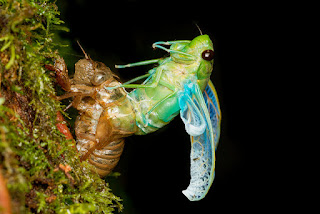Bags packed and final preparations done, I dragged my
jetlagged body out of bed and prepared to set off for San Vito, the town where
the OTS Las Cruces Station was located. On one hand, I was eager to finally be
heading out into the wilderness of the neotropics, and on the other, after
having been on the plane for the past two days, my body was crying out for half
an hour more of sleep. Driving through the highlands of Cerro de la Muerte en
route to the station, we stopped by a quaint little coffee shop and were greeted
by magnificent hummingbirds, an apt café companion considering that we were in
Costa Rica.
Having spent my growing years in the tropics, I imagined that
I had a pretty good idea of what to expect here in Costa Rica. Now, a week into
the course, I figured that I have been proven wrong. As a budding naturalist, I
have been awestruck by the diversity of organisms present in and around the Las
Cruces station. Having made several new discoveries on a night walk with
Mauricio, some of us felt the urge to search for more interesting critters and
organized our own night walks in the following days. We were not disappointed. Every new discovery
made, be it a cicada emerging from a molt, or a tree frog perched on a
bromeliad, brought a great sense of satisfaction, and taught me that being a
field researcher starts by having a deep sense of curiosity and respect for
nature.
Thus far, one of my biggest takeaways from the course came
partially from the classroom and partially from lunchtime conversations. Being
an avid coffee drinker (would not go as far as to call myself a connoisseur), I
was intrigued by the lecture presented by Erika on coffee plantations and
production as it offered an extra dimension in thinking about my favorite
caffeine infused drink. This was no
longer an over the counter beverage from Joe Van Gogh but a product that has
repercussions on the environment, on workers in the field, as well as the
economies of several industries. It was enlightening to see how international
economic policies could affect the expansion, abandonment and modification of
coffee plantations and the cascading effects on ecosystem complexities,
organismal diversity and environmental degradation or preservation.
 At an overarching level, I have a deeper appreciation of where
my food comes from. I hope to tweak my consumption patterns perhaps as a
gesture of being cognizant of the issues rather than naively hoping that an
individual action would lead to sweeping changes on the global environmental
front. Here’s to more good weeks in Costa Rica. Pura Vida!
At an overarching level, I have a deeper appreciation of where
my food comes from. I hope to tweak my consumption patterns perhaps as a
gesture of being cognizant of the issues rather than naively hoping that an
individual action would lead to sweeping changes on the global environmental
front. Here’s to more good weeks in Costa Rica. Pura Vida!
Donovan Loh

No comments:
Post a Comment